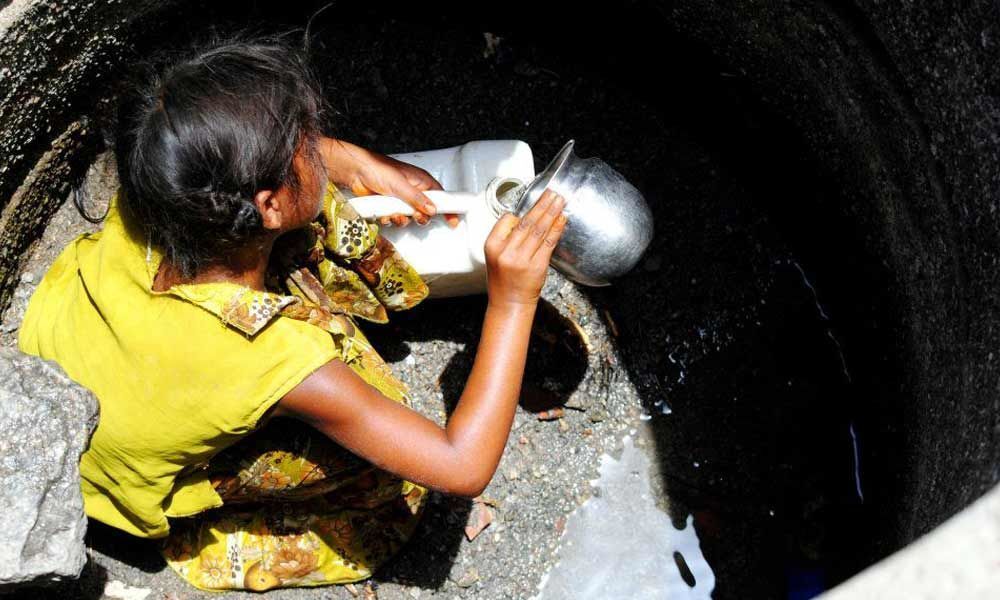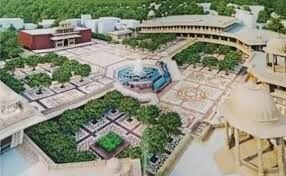Groundwater fast drying up in city

The water experts say that rapid growth of colonies with 95 per cent of concretisation leaving minimal space for gardens or lawns and a huge populace drawing groundwater without replenishing it are the main reasons. NGRI Director, scientist V M Tiwari said that the levels might dip to another five meters by the end of May 2019 The drainage and industrial effluents percolating and mixing with groundwater also affected the quality of groundwater which is now non-potable due to high presence of totally dissolved solids (TDS) and toxins and heavy metals like lead, iron, chromium, zinc was found in the water, as per the report of NGRI
Hyderabad: According to a recent report by NITI Aayog, Hyderabad would run out of groundwater by 2020.
The National Geophysical Research Institute (NGRI) scientists too agree with the report.
Despite excessive rainfall in 2017-18, the city received only 1,123 mm of rain, nearly 44 % higher than the normal rate that is 750-800 mm, yet the groundwater levels are far from satisfactory and depleting levels continues to be at an alarming state.
The water experts say that rapid growth of colonies with 95 per cent of concretisation leaving minimal space for gardens or lawns and a huge populace drawing groundwater without replenishing it are the main reasons.
NGRI Director, scientist V M Tiwari said that the levels might dip to another five meters by the end of May 2019.
According to NGRI study, the rampant use of water from the borewells has created the situation worst.
There are about 18 lakh borewells in Greater Hyderabad Municipal Corporation limits as per the records.
The groundwater levels in the city saw fluctuations at an alarming scale in the past 10 years.
The groundwater level in 2018 was at 7.3 mt depth, in 2017 it stood at 9.3 mt, in 2016 at 12.5 mt, in 2015 at 11.8 mt, in 2014 at 9.46 mt, in 2013 at 7.39 mt, in 2012 at 6.2 mt, in 2011 at 5.5 mt, in 2010 at 5.2 mt and in 2009 at 6.1 mt.
Groundwater is being exploited with the increase in population and using water indiscriminately to meet the domestic and irrigation needs.
The groundwater is drawn through shallow and deep bore wells that are dug up to a depth ranging from 100-300 ft depending upon the geological terrain of the area.
Normally, borewells are dug up to 150 ft, but recently there have been fresh requests from residents in some areas for digging borewell below 400 ft.
The revenue officials permit borewell digging up to 400ft only and that after groundwater department's scrutiny and submission of a feasibility report.
But sources allege that locals manage revenue officials to dig borewells beyond 400 ft.
It is learnt that in areas like Shaikpet, which has a rocky terrain beneath, residents are digging borewells up to 800 ft.
The drainage and industrial effluents percolating and mixing with groundwater has also affected the quality of groundwater which is now non-potable due to high presence of totally dissolved solids (TDS) and toxins and heavy metals like lead, iron, chromium, zinc was found in the water, as per the report of NGRI.
The worst-affected areas of depleting groundwater are West Marredpally, Trimulgherry, Medchal, Asifnagar, and Charminar.
There is a slight depletion in the groundwater levels in areas like Ameerpet, Sanjeevareddy Nagar, Erragadda, Khairatabad, and Nampally.
Hyderabad is a hard rock land, and that is the reason only 10-20 percent of rainwater reaches the ground and rest washes away.
The present population in Hyderabad is 9.7 million and by 2025 it might be 11.65 million and demand of the ground water will be double.
Visualizing this situation in mind, CSIR-National Geophysical Research Institute (CSIR-NGRI) and Telangana State Ground Water Department (TSGWD) are jointly executing a National Hydrology Project, which started on January 2019.
CSIR-NGRI principal scientist and head PME, Dr M J Nandan said a study is being conducted on the impact of urbanisation on groundwater quality and management in Hyderabad and it aims at a comprehensive understanding of the groundwater quality issues in the city.
The state Government is trying to connect all the places through surface water supply as said by higher officials of NGRI.
Guidelines for rain/roof top water harvesting structures
Recharge structures should be designed and constructed in favourable geological conditions i.e. permeable soils followed by murram etc.
The structures should not be taken up in impervious clayey soils, rock and steep sloped areas.
Recharge structures should be preferred for recharging to depleted aquifers with deep water table.
They should not be taken up in the shallow water table areas.
The depth to water level should be not less than 5 to 6 meters in post-monsoon period.
Recharge structures should be taken up with unpolluted surface water only.
Adequate precautions should be taken to prevent entry of polluted urban surface runoff water, sewerage water into recharge structures Recharge structures should be planned and taken up in over exploited and critical areas experiencing intensive ground water development for various uses.
All existing kuntas and tanks in and around the urban agglomeration areas are to be protected against encroachments and should be converted as percolation ponds and tanks.
The polluted drainage and other industrial pollutants should not be allowed to let into these tanks.
Ground water recharge through shafts is preferable in steep slope areas. (Courtesy: https://www.hyderabadwater.gov.in)















